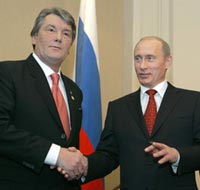
CRISIS OF UKRAINE’S STATE INSTITUTIONS
Publication: Eurasia Daily Monitor Volume: 3 Issue: 21
By:

The Kremlin’s “gas attack” on Ukraine exploited an ongoing crisis of state institutions in that country and exacerbated the crisis almost to the point of meltdown. This situation undermines the country’s and its president’s capacity to resist Moscow’s emerging strategy to recapture key economic and political positions in Ukraine, one year after the Orange Revolution.
The signing of the January 4 gas agreement with Russia illustrated the dangers stemming from the growing weakness of Ukraine’s state institutions. Basically, just two individuals, Fuel and Energy Minister Ivan Plachkov and Naftohaz Ukrainy chairman Oleksiy Ivchenko, negotiated and signed a dubious agreement in complete secrecy in Moscow, without the support of experts from government agencies that are traditionally involved in such negotiations, without consultation with the cabinet of ministers, and without public accountability even after the highly controversial agreement had been signed. Their briefings afterward to the media proved misleading, and they then declined to testify to the parliament, in effect setting up Prime Minister Yuriy Yekhanurov to take the fall. (Yekhanurov initially also dissembled on the gas agreement, but eventually distanced himself from it.) Meanwhile, President Viktor Yushchenko continues describing the gas agreement as an unqualified success even crediting Russian President Vladimir Putin for contributing to the purported success despite massive domestic and international criticism of key parts of the agreement.
The gas agreement provided the parliament with the political excuse to exercise its right to dismiss the government, although the parliament itself will only have the constitutional right to install another government after the March elections. Yushchenko disputes the legal validity of the parliament’s no confidence vote and insists that the government has not been reduced to “acting” status, but that it continues to operate with full authority. Nevertheless, the president and government are looking for legal avenues to establish that the government has the standing required for signing international agreements. A determination on that issue cannot be reached, however, because Ukraine does not have an operating Constitutional Court. The parliament and the president are accusing each other over failures to fill and swear in their respective quotas of seats on the Court. Each side fears that the other might use the Constitutional Court as a tool in the conflict between president and parliament over implementation of constitutional reforms.
By all accounts, the president is attempting to renege on his December 2004 agreements with parliament on constitutional reform that would transfer certain presidential powers to the parliament and government. Yushchenko now claims that the procedure of reaching those agreements was hidden from the public and that the substance of the constitutional reforms was not debated or understood prior to their adoption by parliament. Such claims are factually unsustainable. The procedure was highly publicized at the time; the parliament held detailed debates before passing the constitutional reforms; and the pro-presidential bloc Our Ukraine voted for the reforms as well.
Because of his differences with the majority of deputies over the no confidence vote in the government and the constitutional reforms, Yushchenko has launched a war of words on the parliament. He has recently been describing the majorities that oppose him on those issues as “destabilizers,” “anti-state,” “destructive,” “fifth column,” “parasitical”; he describes their decisions as “illegal,” “anti-people,” and the parliament’s composition itself as unrepresentative (“lost the people’s ideological support”). The president warns that he would call a popular referendum (either before or after the upcoming parliamentary elections) in order to cancel the constitutional reforms. This course, if continued, would cause Yushchenko and his Our Ukraine bloc to lose their remaining or potential allies in this parliament and that to be elected in March. On a fundamental level, it reflects inadequate understanding of political and state institutions as such.
While that inadequacy seems common to a wide range of political forces and interest groups in Ukraine and beyond, it becomes all the more debilitating when it afflicts the top level of the executive branch.
Immediately after the Orange victory, de facto parallel governments emerged in the National Security and Defense Council (NSDC) and the Presidential staff, in addition to the constitutionally empowered cabinet of ministers. One year later, laws have yet to be adopted on the functioning of those institutions. After NSDC’s first head, Petro Poroshenko, had vastly exceeded his prerogatives, Poroshenko’s successor, Anatoly Kinakh, does so selectively on key issues. During the gas crisis, for example, Kinakh publicly proposed entrusting the management of Ukraine’s gas transit pipeline system to Russia. Simultaneously he declared that Ukraine would no longer tolerate infringements of its national sovereignty, such as giving up lucrative contracts for its turbines (an allusion to Washington’s earlier demand that Ukraine abandon the turbine contract for Iran’s Bushehr nuclear power plant). Both of Yushchenko’s appointees as NSDC heads have no background in national security, and both have played the Russia card while in that post. Despite such dysfunctionalities, the NSDC seized a number of portfolios from the Ministry of Foreign Affairs. Meanwhile, for a year after the Orange Revolution, Ukraine had no ambassador in Washington and other key capitals.
In sum, Ukraine is traversing an institutional and a constitutional crisis, as well as a deficit of competence at the top. Against this backdrop, Yushchenko’s unofficial meeting with Russian President Vladimir Putin on January 11 in Astana initiated a potentially wide-ranging rapprochement. An embattled Yushchenko feels that he needs that relationship to shore up his presidency and improve his bloc’s electoral prospects. For their part, influential Kremlin advisers calculate that a weakened and isolated Ukrainian president might be used, particularly in the post-election period. Risky under any circumstances, a personal rapprochement with the Kremlin could prove especially dangerous for Yushchenko to undertake without the backing of effective democratic institutions and a functioning government.
(Survey based on Ukrainian media coverage of the political crisis, January 2006; see EDM, January 12, 25)




